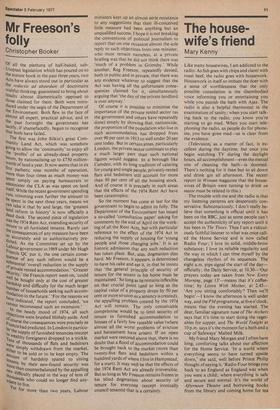Mr Freeson's folly
Christopher Booker
Of all the plethora of half-baked, subUtopian legislation which has poured on to the statute book in the past three years, two Acts have always stood out in particular as the reductio ad absurdum of doctrinaire Wishful thinking, guaranteed to bring about results almost diametrically opposed to those claimed for them. Both were introduced under the aegis of the Department of the Environment. Both flew in the face of almost all expert, practical advice, and in the past fortnight the government has tacitly, if shamefacedly, begun to recognise that both have failed.
The first was John Silkin's great Community Land Act, which was somehow going to allow the 'community' to enjoy all the 'profits' of an already-dead property hciom, by nationalising up to £750 millionworth of land a year. It now seems that in its "st pathetic nine months of operation. More than four times as much money was sPent simply on paying bureaucrats to administer the CLA as was spent on land Itself. While the recent government spending !ins, trimming even further the amount to
sPent in the next three years, means we Fan take it that by and large, the 'greatest land reform in history' is now officially a dead duck. The second piece of legislation was the 1974 Rent Act, extending security of
tenure to all furnished tenants. Rarely can the
consequences of any measure have been
s? accurately and so authoritatively predicted. As the Committee set up by the liabour government in 1969 under Mr Hugh rancis QC put it, the one certain consequence of any such reform would be a substantial 'overall reduction in the supply
?fPrivate rented accommodation.' 4ecurity., the Francis report went on, 'could
hwell be bought only at the cost of greater nardslliP and difficulty for the much larger
uMber of households seeking such accom
dat ion in the future.' 'For the reasons we "Jaye indicated,' the report concluded, 'we cannot recommend such an extension.' obl.n the heady mood of 1974, all such ,deetions were brushed blithely aside. And
course the consequences were precisely as
rancis had predicted. In London in particutaor the supply of furnished tenancies (except vvealthy foreigners) dropped to a trickle. Wens of thousands of flats and bedsitters ere simply withdrawn from the market, am er th to be sold or to be kept empty. The teount of hardship spared to sitting :ants by their new-found security was nenrc than counterbalanced by the appalling thw difficulty placed in the 'way of tens of whnusands who could no longer find any ‘.ere to live.
Yet for more than two years, Labour ministers kept up an almost eerie resistance to any suggestions that their ill-conceived little measure had been anything but an unqualified success. I hope it is not breaking the conventions of political journalism to report that on one occasion almost the sole reply to such objections from one minister, who must remain nameless, at a private briefing was that he did not think there was 'much of a problem in Grimsby.' While another, Reg Freeson, repeatedly denied, both in public and in private, that there was any evidence whatever to suggest that the Act was having all the unfortunate consequences claimed for it, simultaneously arguing that 'the day of the private landlord is over anyway.'
Of course it is possible to minimise the importance of the private rented sector (as the government and others have repeatedly done) simply by showing that, nationwide, the proportion of the population who live in such accommodation has dropped from over 90 per cent in 1913 to well under 20 per cent today. But in certain areas, particularly London, the private sector continues to play a much larger part than such national figures would suggest. In a borough like Camden, with its long tradition of catering for young and single people, privately rented flats and bedsitters still account for more than 50 per cent of all the housing stock. And of course it is precisely in such areas that the effects of the 1974 Rent Act have been catastrophic.
So the moment has come at last for the government to begin to admit its folly. The Department of the Environment has issued a so-called 'consultation paper' asking for comments by the end of April on the working of all the Rent Acts, but with particular reference to the effect of the 1974 Act in reducing the supply of housing for 'young people and those changing jobs.' It is an historic admission that any such reduction has taken place. But, alas, dogmatism dies hard. Mr Freeson, it appears, is determined to have his cake and eat it, in that he insists that 'the general principle of security of tenure for the tenant in his home must be maintained.' So long as he remains inflexible on that crucial point (and so long as the capital value of a property drops by 50 per cent or more so soon as a tenancy is created), the appalling problem created by the 1974 Act will remain. The only conceivable comprOmise would be to limit security of tenure in furnished accommodation to houses of a fairly low rateable value (where almost all the worst problems of eviction and harassment have arisen). If an open market were restored above that, there is no doubt that a flood of accommodation could be brought back to the market (more than twenty-five flats and bedsitters within a hundred yards of where I live in Hampstead, for a start). It may well be that the effects of the 1974 Rent Act are already irreversible. But so long as Mr Freeson remains frozen in his blind dogmatism about security of tenure for everyone (except ironically council tenants) that is a certainty.


































 Previous page
Previous page